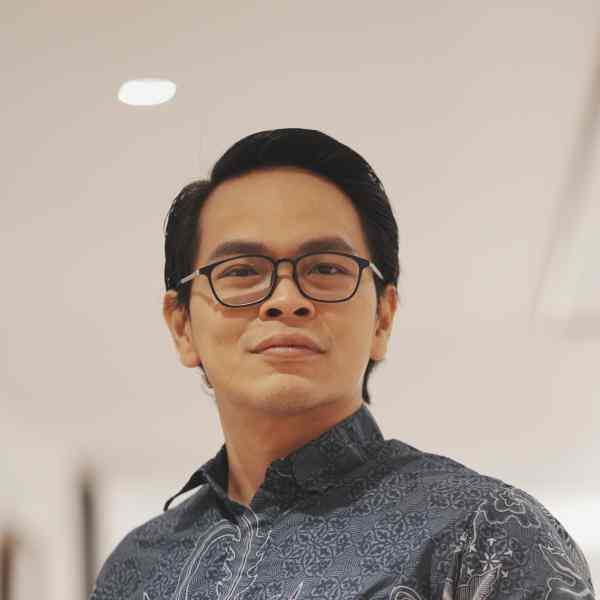Introduction
Benny Prawira Siauw, through his organization Into The Light, is working with young people, universities, media, and the government to shift societal attitude towards suicide prevention and changing the way society practices mental health in Indonesia.
The New Idea
Suicide is a serious problem worldwide including in Indonesia. The national mortality rate due to suicide is 0.71 per 100,000 people; on average 20 Indonesians commit suicide every day. Still, there are many cases left unreported and ‘hidden’ due to social, cultural, and religious stigmatization. This stigma hinders the effort from psychologists, psychiatrists, and the country to obtain accurate data and worse, to prevent suicide. Benny believes that shifting the societal attitude and breaking the taboo is the key for countries to make progress in preventing suicide. With various interacting factors that influenced suicidal behavior such as personal, social, psychological, cultural, biological, and environmental, the protective factors in the form of personal and environmental support are critically needed to protect people from suicidal behavior. Benny is pulling out various interacting factors to protect people from suicidal behavior especially for young people.
Through his organization, Into The Light Indonesia (ITL), he is building systemic intervention of suicide prevention through building resilience of young volunteer counselors, changing the public discourse by leveraging the media, and providing accessible local knowledge towards the issue. He puts young people as the main engine to advocate, educate, and promote community support on suicide prevention and mental health issue based on scientific evidence and human rights approach. Since its establishment in 2013, ITL has become the pioneer of a youth-based organization that focuses on shifting societal attitude towards people who have thoughts, have tried, or have died as a result of suicide, as well as encouraging help-seeking behavior in the community regarding mental health issues. To achieve the goal, ITL works on three main task forces to hold the systemic intervention accountable: Suicide Primary Prevention, Suicide Crisis Intervention, and Suicide Postvention, to target different stage of the suicide cycle. As the focus of each taskforce, the network of volunteer has been working beyond direct measures to influence people’s mindset and behavior. In 2018, the team collaborated with Kantor Berita Radio (KBR) to produce a massive podcast around mental health and suicide prevention as the strategy to be heard by young people. ITL also collaborated with the press council to translate the Suicide News Guideline by WHO and encouraged the implementation of guidelines with local context. The guideline has been socialized into the Alliance of Independent Journalists Indonesia (AJI) to prevent copycat suicides from happening due to improper reporting.
With his intervention, the public awareness about suicide prevention effort has started to grow, especially in young people in social media. The suicide news guidelines have been helpful to journalists as well as to the ITL team to monitor behavior changes. More than one hundred journalists in Indonesia had shown an increase in their knowledge of and skills on reporting suicide. Nevertheless, Benny is still advocating for stricter implementation in each media company so that media workers will adhere to the whole points in the guideline. ITL continues to work on the qualitative study and popular book publication of suicide prevention from cultural lenses of Indonesia. They are also working to digitalize the data of hospitals or community health centers that have psychological services, making it easy for people to ask for help. Currently, with better publication of suicide news and its training workshops, media industries already have better coverage on suicide news where they start to put out helpful information so the people with similar experience are encouraged to seek professional help.
The Problem
The stigma of mental illness comes from every aspect of human life, including culture, religion, values, and mental health care systems. In many countries including in Indonesia, people still strongly believed that mental illness (including suicidal thoughts) is related to evil spirits and is associated with a lack of faith in religion. This has created a strong stigma around mental illness, and negative stereotypes, prejudice, and discrimination create significant obstacles to improving the quality of life for people with mental disorders. Stigma causes people with mental illness to avoid seeking treatment, contributes to the treatment gap, and worsens outcomes in physical and mental domains. The stigma of mental illness also contributes to suicidal ideation in people with mental illness, which is exacerbated by social isolation, secrecy and hopelessness, and anticipated discrimination.
Indonesian culture tends to label individuals with suicidal thoughts as dangerous and weak. The perception that persons behave violently was considered as a major reason for general public displaying stigmatizing behaviors and attitudes toward persons with mental illness or suicidal thought. According to WHO, the highest death toll from suicide is in Southeast Asia and Europe, with a higher mortality rate for men than women. Social construction and stigma regarding gender – such as that men should be stronger than women or that men should not cry because it means that they are weak – are some of the reasons why people with mental illness (especially men) are reluctant to seek family or professional help and tend to hold on to their feelings. Holding feelings back can trigger more stress, depression, and even chronic psychological disorders that could lead someone to end up having suicidal thoughts or commit suicide. Due to exposure to prevalent public stigma, many people with mental illness experience isolation, rejection and social distancing from society, friends, families, and partners. People with mental illness were also commonly regarded as a shame or guilt to the whole family. The stigmas affect people on both personal and structural level, reflective of how the issue has been largely neglected by the government.
The implementation of The Mental Health Law in Indonesia has also been neglected since it was signed seven years ago in 2014. Programs addressing mental health issues tend to be severely underfunded; only 1% of the budget was allocated for mental health issue. Furthermore, mental health professionals are largely located in capital cities, especially in Java, and many people can’t afford mental healthcare services since psychiatrist or psychologist fees are too expensive and not accessible to them. Apart from that, people’s stigma towards going to psychologists and psychiatrists is still inconclusive. People tend to prefer seeking help from religious leaders because going to a psychologist or psychiatrist is considered taboo. Common people, especially from the lower middle class, still find it difficult to access mental health services due to lack of education, strong negative stigma, and lack of funds to seek professional help. When it comes to youth mental health issues and suicide, there has never been sufficient literacy and information, so young people often do not know how to manage their psychological conditions. This neglect may result in lower quality of life, reduced functioning, and productivity, as well as leading to higher rates of suicide attempts in young people. When left untreated, long-term mental health conditions have been shown to increase the risk of suicidal behavior. In Indonesia, the mortality rate due to suicide is 0.7 per 100,000 people or 1,800 people per year. This number is an unweighted number, so if it is calculated by weighting the completeness of recording, the suicide rate will be even greater. In terms of gender, men are 3x more likely to die from suicide than women. 75% of deaths due to suicide occur at productive ages, 15-64 years and 46% occur at young and productive ages, 25-49 years. The number is potentially higher due to uncovered stories from the family and community.
The Strategy
To build a better suicide prevention system in Indonesia, Benny and Into The Light are using research, education, and advocacy approaches in their strategy. They accommodate young volunteers to spread awareness, nurture help-seeking behavior, and shift societal attitude towards the suicide prevention issue. The organization, which is mostly mobilized by volunteers, focuses on three different taskforces to hold the systemic intervention accountable – (1) Suicide Primary Prevention, (2) Suicide Crisis Intervention, and (3) Suicide Post-vention.
Together with his organization, Benny continues to develop mental health and suicide prevention training modules for the youth volunteers. They have intensively trained 25 people per year from across the Greater Jakarta Area since 2016. The intensive trainings for volunteer counselors are designed to enable young people, especially those who have lived experiences, to conduct their own research and programs to support reforming the suicide prevention system in Indonesia. The training – called “Rise and Shine” – has been proven to be effective in significantly reducing stigma toward those who have suicidal ideation and those who are bereaved by suicide.
Besides these internal training sessions, they have also collaborated with schools, institutions related to higher education, youth NGOs, as well as youth based religious communities. Each year they hold more than 50 sessions for these various organizations. They utilize special modules designed for school and university students to equip them with all the necessary knowledge and skills related to stress management, mindfulness and well-being, active listening, as well as suicide first aid. These training are essential in order to enable people with mental health issue to support themselves and their peers effectively during their challenging adolescence and academic years. Aside from that, they are actively looking for international and national research institutions to conduct the collaborative study of suicide prevention since there are very few research studies available in Indonesia. Besides working with youth, they are committed to mental health advocacy efforts and engaged with healthcare professionals in advocating for policy change – especially the Ministry of Health. ITL bring youth involvement and engagement in health system reform to the forefront by giving them a seat on the table to change the public policy. They believe that the youth are always the group most affected by healthcare policy decisions – thus why they will always call for more youth presence in mental health panels and greater youth involvement in program or policy planning discussion.
One of the most notable achievement in Indonesia’s mental health field is in advocating for the adoption of WHO’s global suicide news reporting guideline. Benny pushed for this standard because back then there was no national suicide news reporting guideline in Indonesia – a situation which had led to several copycat suicides and the further stigmatization of people living with mental disorders or suicidal tendencies. Together with the community they built an advocacy coalition to work with The National Press Council in developing the guideline to make sure that the guideline not only adhere to WHO’s global guideline but also takes Indonesia’s local cultural contexts into account. The successful adoption of this reporting guideline will hopefully also help in advocating for the development of a national suicide prevention strategy.
Into the Light also holds online suicide news guideline workshops. They have already trained over 100 journalists in Jakarta, Jambi, Medan, Lampung, and Pontianak. Media workers are really keen to know more about how to safely report suicides. There was so much enthusiasm from local journalists in each area to be involved in the workshop. There has been no resistance toward the idea of implementing the suicide news guideline, since journalists are also concerned about the way it has been reported in the past. However, they still need more work in improving their knowledge on suicide in order to perform better when reporting on suicides as well as to produce greater adherence to the suicide news guideline. If these workshops can be conducted in each and every media company to educate their respective editorial and newsroom staff, Benny believes that the WHO guidelines will create a much bigger impact.
To date, Benny and ITL have developed the online suicide news database and monitoring since 2013, trained 125 young people with lived experience of suicide, and published various qualitative research with universities on topics from suicide stigma to measurement tools, help seeking intention, and suicide recovery needs. He has conducted two FGDs with National Press Council on suicide news guideline development with more than hundred journalists from 83 media platforms trained to improve their knowledge and skill on reporting suicide and prevent copycat suicides. In order to run his strategies, Benny is mobilizing the support from individual or organizational donations as well as grants; he cites his strong community network of volunteers as a key to his impact so far. To replicate the model all across Indonesia, Benny enables more young people to initiate their own research and program on suicide prevention in their own region.
The Person
From the experiences of being bullied as a minority and a boy with asthma, Benny learned to develop a sense of understanding his emotions and began to question the philosophy of life, happiness, suffering and the nature of good and evil, in his early age. The philosophical questions in his mind were so deep that he found it difficult to be addressed by his family and friends. Oftentimes, he would isolate himself and tried to observe the various emotions he had been experiencing by himself. From his past personal experiences of illness, discrimination, and all attempts of finding the answers to his question, he spent a lot of time reading about life existence and became more interested to understand human suffering and all means to alleviate it. Those experiences also made him interested in learning psychology, to understand himself better and to understand people’s behavior in a better way.
His first encounter with professional neurologists and psychologists was when he was diagnosed with epilepsy and experienced frequent relapses and seizures. He started to realize how his psychological condition strongly affected his recovery effort to epilepsy. The treatment unfortunately had to come to an end due to financial struggles faced by his family. Still dealing with his recovery process, Benny was also treated differently and experienced discrimination, prejudice, and stigma in his high school environment because of his minority status as a Buddhist of Chinese descent. He began to question how to break that chain of discriminatory treatment and built his own hypothesis that the discrimination and violence were manifestations of people’s ignorance. It then inspired him to bridge discussions among his friends to understand each other and involve more minorities so that there would be no more intolerance and discrimination in his school.
After a four-year break due to financial issues, he was finally able to pursue a bachelor degree in psychology. His childhood experience made him want to be able to live meaningfully to those around him. In 2012, he first encountered a friend who had attempted to commit suicide. It reminded his own experience of having suicidal thought when he suffered from an abusive relationship. With his deep empathy, he was trying to help his friend by gathering information and resources regarding suicide prevention. However, there was not enough information about suicide or mental health in general as mental health issues were still considered taboo and less important in Indonesia. His findings about suicide prevention were all in English and very difficult to understand. He was also surprised to know that there was very little information on suicide prevention, but there was a lot of coverage about suicides in the media. The suicide news in contrast, led to many overlapping issues that have sprung up in society and triggered copycat suicide. Benny then initiated a very first seminar called “Into the Light” and surprisingly received positive feedback from the participants and society. Seeing the public convening around this issue, he began to build awareness of suicide prevention and mental health issues, and later began working to shift societal attitudes towards suicide.
Moved by his own experiences, Benny built the strong network of volunteers with lived experiences and amplified their voices to spread the awareness to wider audiences. His deep empathy and courage have encouraged many young people to join forces with him and start putting suicide prevention as a more noticeable issue in Indonesia. His motto has inspired many young people in the organization; “Suicide prevention is everyone’s business and should be addressed systemically.”




